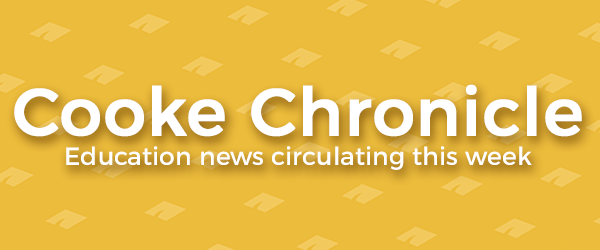Ensuring access to gifted programs and higher ed

March 10, 2017 – Here’s our weekly roundup of education news you may have missed. Educators and policymakers look to increase access to gifted programs and higher education for underrepresented students. Subscribe here to receive the Cooke Chronicle each week in your inbox.
We are currently accepting applications for the 2017 Cooke Young Scholars Program! High-achieving 7th graders with financial need are encouraged to apply for this unique scholarship. The Cooke Foundation provides comprehensive academic and college counseling, funding for extracurricular enrichment, and access to a community of ambitious peers. Tell a talented student to start an application today!
Elementary & Secondary Education:
- “Gifted and talented children are found in all demographic groups,” writes M. René Islas for Scholastic’s education blog. “However, many qualified children—those who live in poverty, have some disabilities, are from racial and ethnic minority groups, or are learning English—are overlooked for gifted programming.”
- As educators and edtech organizations gathered at SXSWedu this week, a central concern of many presenters and attendees was ensuring equity. EdSurgesummarizes criticism and suggestions from the conference. The American Enterprise Institute reports on how several governors plan to utilize edtech to benefit students in rural areas of their states.
- A school district in Spokane, Washington hopes to close the gap between high-income and low-income graduates who go on to college. The New York Times profiles one school’s efforts to raise expectations and increase enrollment in Advanced Placement (AP) courses.
Higher Education:
- “The Pell program, typically helping families that earn less than $60,000 a year, is crucial for students from modest backgrounds,” states The Washington Post. “But the money states provide those students can also be significant factor in their ability to pay for college.”
- The IRS data retrieval tool that allows students to provide financial information in the Free Application for Federal Student Aid (FAFSA) will be unavailable for several weeks. Inside Higher Ed reports that this outage “will make applying for financial aid more difficult for low-income students and could lead to more verification checks of aid applications.”
- “Nearly half of all colleges provide living-cost allowances at least 20% above or below estimated county-level living expenses,” finds a new study published in The Journal of Higher Education. Students and their families frequently use these estimates in planning for college costs.
Cooke Foundation Highlights:
- In an article highlighting the benefits of acceleration for high-ability students, the Thomas B. Fordham Institute cites findings from our “Equal Talents, Unequal Opportunities” report.
- Essex County College spotlights Cooke Scholar Sofia Medina, who recently graduated from Johns Hopkins and plans to continue on to medical school in fall 2018.